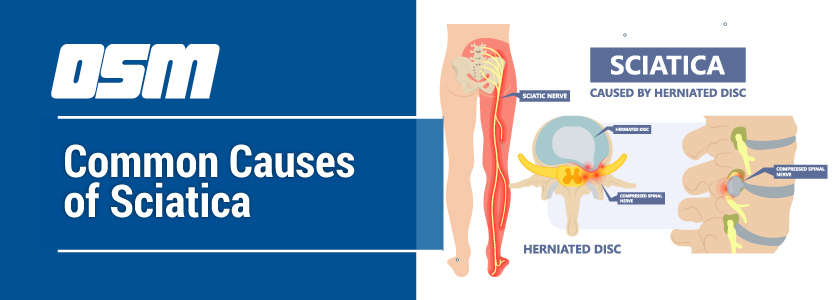Common Causes of Sciatica
From Medical News Today
Sciatica is a type of nerve pain that radiates down the back into the hip and leg. It often goes away in a few weeks, but for some people, the condition is chronic.
The pain can feel like an intense cramp or burning electrical sensations.
Sciatica that lasts more than 3 months or that goes away and comes back may be chronic sciatica.
Chronic sciatica is a long-term condition that can cause ongoing pain. It is more difficult to treat than acute (short-term) sciatica, but several remedies can offer relief.
This article reviews what sciatica is, what causes it, and how to treat it.
Why is my sciatica not going away?
Sciatica happens when something presses on or traps the sciatic nerve.
The most common cause is a herniated disk in the lower spine.
Another risk factor is spinal stenosis, a condition that causes the spinal column to narrow.
Herniated disk
Doctors do not know why some cases of sciatica become chronic.
Many acute and chronic cases happen because of a herniated disk. In most cases, herniated disks improve on their own within a few weeks. When they do not, this may cause chronic pain.
Injury
People with herniated disks often remember a specific injury that triggered the pain.
An injury does not mean that the pain will be chronic.
However, people who have a herniated disk from an injury may develop the same injury again, especially if they continue repeating the movements that led to it.
Inflammation
Inflammatory conditions can trap spinal nerves, causing sciatic pain.
People with chronic inflammatory conditions, such as rheumatoid arthritis, may notice that their sciatica flares when their condition gets worse.
Treating the underlying condition may help treat the sciatica.
Infection
An infection in or around the spine can cause an abscess, which is a swollen and infected mass. This abscess can trap spinal nerves, causing sciatica and, sometimes, other symptoms.
A person with an abscess may develop a fever, have pain in other areas of the body, or find that sciatica begins after they have another infection.
Spinal mass or cancer
Any type of mass in or near the spine may trap spinal nerves, causing sciatic pain.
Some masses are cancerous. In other cases, an epidural hematoma, which is a swollen blood spot near the spine, can cause the pain.
It is important that people with sciatica see a doctor to rule out potentially dangerous conditions such as cancer, especially when sciatica does not go away.
Wear and tear
As a person ages, the normal wear and tear on their spine can cause the spinal column to narrow, resulting in spinal stenosis.
For some people, spinal stenosis causes chronic or worsening pain.
Lifestyle issues
Several lifestyle factors may increase the risk of sciatic pain or extend the healing time.
People with these risk factors may find that sciatica becomes chronic or recurs. Risk factors for sciatica include:
- little physical activity and prolonged sitting
- having overweight or obesity
- smoking
As sciatica often follows an injury, people may also find that the symptoms do not improve if they continue the activity that caused the original injury.
Spinal misalignment
When the spine is not properly aligned, such as when a person has scoliosis or another chronic condition, it can put pressure on the space between the vertebrae.
This pressure may cause herniated disks. It can also compress the sciatic nerve, causing nerve pain. Depending on the cause, a person may need surgery, physical therapy, or other treatments.
Sciatica can and does come back, especially when a person has a chronic medical condition.
People who do not make lifestyle changes to prevent more sciatic pain may also redevelop symptoms. However, for most people, sciatica heals on its own within a month or two.
The Orthopedic & Sports Medicine Center of Oregon is an award-winning, board-certified orthopedic group located in downtown Portland Oregon. We utilize both surgical and nonsurgical means to treat musculoskeletal trauma, spine diseases, sports injuries, degenerative diseases, infections, tumors and congenital disorders.
Our mission is to return our patients back to pain-free mobility and full strength as quickly and painlessly as possible using both surgical and non-surgical orthopedic procedures.
Our expert physicians provide leading-edge, comprehensive care in the diagnosis and treatment of orthopedic conditions, including total joint replacement and sports medicine. We apply the latest state-of-the-art techniques in order to return our patients to their active lifestyle.
If you’re looking for compassionate, expert orthopedic surgeons in Portland Oregon, contact OSM today.
Phone:
503-224-8399
Address
1515 NW 18th Ave, 3rd Floor
Portland, OR 97209
Hours
Monday–Friday
8:00am – 4:30pm




